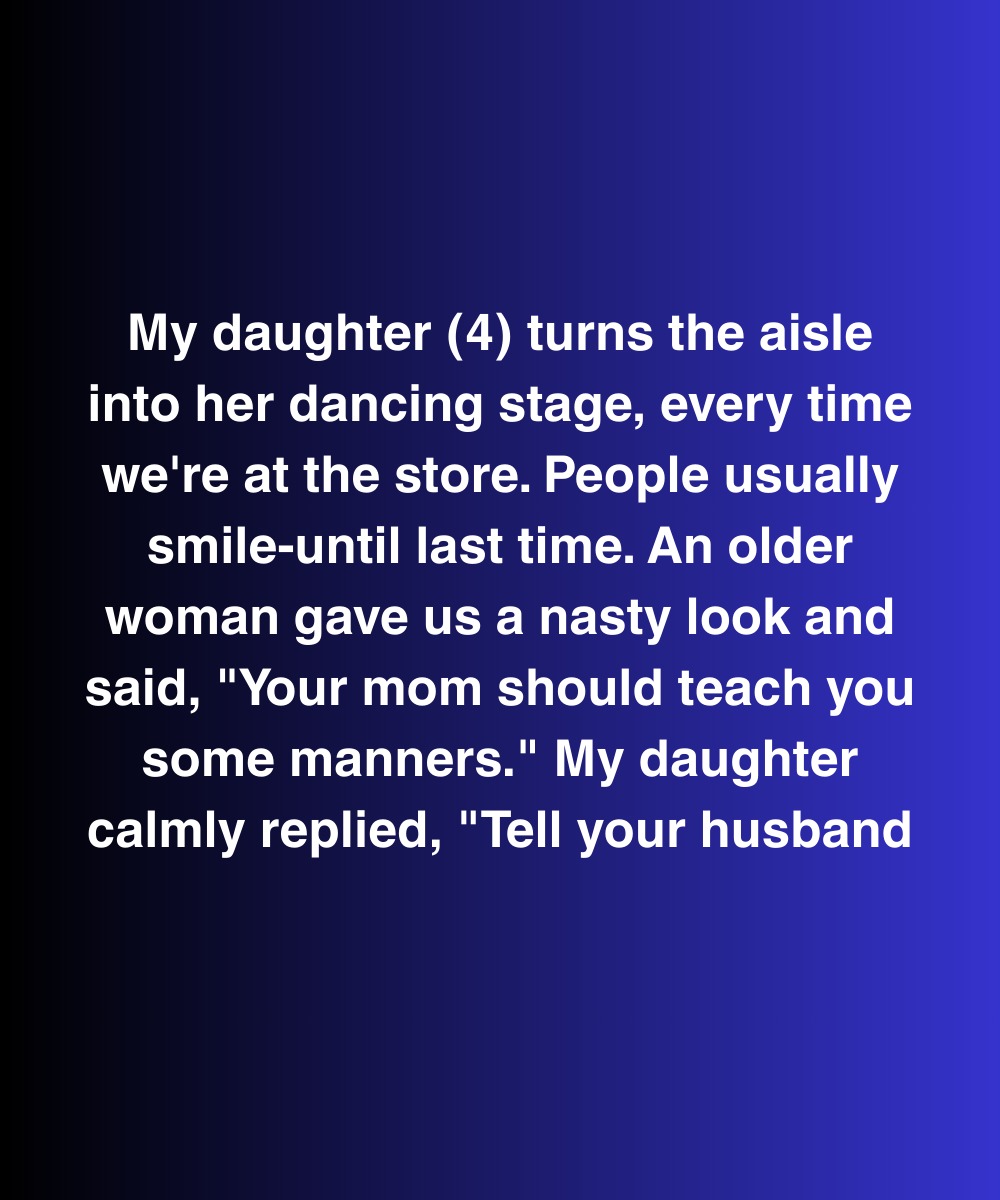My daughter Zariah is four years old, and she doesn’t simply walk through a store like most children. For her, the aisles are a stage, and every beep of a scanner or song playing overhead is a cue to twirl, spin, or launch into a dramatic jazz-hand performance. Most people can’t help but smile when they see her. Some even pause to clap, charmed by her fearless joy. But last week, in the middle of a busy grocery trip, not everyone shared that delight.
A woman standing nearby with her cart wrinkled her nose and muttered just loudly enough for me to hear: “Her mom should teach her some manners.”
Before I could react, Zariah spun on her heel, tilted her head with the fierce preschool sass only a four-year-old can summon, and said: “Tell your husband.”
The woman froze. Her mouth opened as if to reply, then shut just as quickly. She pushed her cart past us, fuming. I was stunned—unsure whether to laugh or apologize. When I knelt down and asked Zariah why she said that, she just shrugged and said, “She looked mean. I think she misses her husband.”
I didn’t know how to respond. Maybe it was something she overheard on a cartoon, or perhaps it was just the unfiltered honesty children speak with. At the time, it struck me as funny. I posted a quick story online, thinking friends and family would get a laugh.
By the next morning, the story had exploded. It went viral—twenty thousand likes, countless memes, and TikToks reenacting Zariah’s bold clapback. People everywhere shared it as an example of children’s unfiltered truth. I was amused, overwhelmed, and a little proud of my daughter’s quick wit. But then the messages started coming.
One, in particular, stopped me cold. A stranger sent me a photo of the woman from the store with a message: “That’s my aunt. Her husband passed away three weeks ago. She’s grieving. Please don’t judge her too harshly.”
Suddenly, my amusement turned to guilt. What had felt like a funny story about a cheeky comeback now carried weight. Zariah hadn’t meant harm, but the moment had become complicated.
Then another message arrived—from the woman herself. Her name was Renata. She said her niece had shown her the viral post, and she wanted me to know she didn’t mind.
“Your daughter reminded me that people still see me,” Renata wrote. “Even when I don’t want them to. I didn’t mean to snap at her. I was just trying to survive the day. And honestly? Her little comment made me laugh. It was the first time I’d laughed in days.”
Her words floored me. Here I was replaying the moment with guilt, while she—the very person I thought I had wronged—had found light in it. We exchanged messages and eventually decided to meet.
That Saturday, Zariah wore her favorite pink tutu. Renata brought her dog, Max. I brought coffee. At first, it was awkward, but the tension melted when Renata knelt to Zariah’s level and gently said, “You saw me, didn’t you?”
Zariah nodded and handed her a shiny sticker. “It helps when I’m sad,” she said. Renata blinked back tears.
As we sat together, Renata shared stories of her husband, Elias, the love of her life for forty-two years. She described quiet Saturday mornings, dancing barefoot in the kitchen to old records, and how the music stopped when he died. She admitted she hadn’t realized how silent her world had become until she saw a little girl spinning freely in a grocery aisle.
She wasn’t angry at Zariah—she was angry at the silence. And in that moment, my daughter had unknowingly reminded her that joy, laughter, and music still existed—even in grief.
Weeks passed, and Renata began joining us at the park on Saturdays. Sometimes she brought Max, sometimes just her stories. Zariah quickly grew attached, calling her “Miss Renny.” One afternoon, Zariah asked if Renata could come to her birthday party. It was a backyard princess tea, and on the day, Renata arrived in a full gown and tiara—one that had once belonged to her granddaughter overseas.
Seeing my tutu-wearing daughter and this elegant, grieving woman both crowned in glittery tiaras, laughing side by side, filled me with indescribable joy. I posted a photo again, but this time the caption wasn’t meant for laughs: “She started as a stranger in a store. Now she’s part of our Saturdays. Grief and joy can dance together, if we let them.”
That post didn’t go viral. It got only a couple hundred likes. But those 200 meant more than the 20,000 from before.
Months later, Zariah’s preschool called with a story that made me tear up. Zariah had told her classmates that her “grandfriend” was picking her up. When I arrived, there was Renata outside, holding a hand-painted sign that read: “Zariah’s Royal Chauffeur.”
I stood there, overwhelmed. The woman who once scolded my daughter for dancing in an aisle was now arriving like royalty to escort her home. This wasn’t karma—it was healing.
My daughter had given Renata joy. Renata had given my daughter wisdom. And I had the privilege of watching two souls—one just learning about the world, the other learning to live again without her partner—bring each other back to the light.
So, let your child dance in the aisles. Let strangers frown if they must. Life is messy, awkward, and unpredictable, but sometimes those collisions create unexpected connections. Sometimes moments that sting lead to the bonds that heal.
You never know who might end up wearing a tiara in your backyard—or who might become family in the most unexpected ways. Life softens, if you let it.
